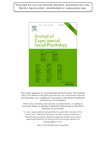Automatic and ironic behavior are both mediated by changes in the self-concept
| dc.contributor.author | Wyer, Natalie | |
| dc.contributor.author | Neilens, H | |
| dc.contributor.author | Hollins, Timothy | |
| dc.contributor.author | Mazzoni, G | |
| dc.date.accessioned | 2014-04-03T11:42:35Z | |
| dc.date.accessioned | 2014-04-03T11:42:43Z | |
| dc.date.available | 2014-04-03T11:42:35Z | |
| dc.date.available | 2014-04-03T11:42:43Z | |
| dc.date.issued | 2011-11 | |
| dc.identifier.issn | 0022-1031 | |
| dc.identifier.issn | 1096-0465 | |
| dc.identifier.uri | http://hdl.handle.net/10026.1/2936 | |
| dc.description.abstract |
Recent accounts suggest that prime-to-behavior effects are mediated by changes to the active self-concept. Likewise, recent reports of post-suppression behavioral rebound have attributed changes to behavior to changes in the self-concept. According to such accounts, whenever an activated trait or stereotype can be easily incorporated into the active self, behavioral assimilation (i.e., behavior consistent with the activated concept) is likely to ensue. Yet, little evidence has emerged to directly support the mediating role of changes to the self-concept. The present research was designed to examine whether changes to the active self-concept are responsible for changes in behavior following stereotype suppression and priming. Participants who suppressed or were primed with stereotypes of the elderly were more likely to endorse stereotypic traits as self-descriptive and to behave in stereotypic ways. Critically, the former effect significantly mediated the latter. Implications for theories of concept activation and behavior are discussed. © 2011 Elsevier Inc. | |
| dc.format.extent | 1300-1303 | |
| dc.language | en | |
| dc.language.iso | en | |
| dc.publisher | Elsevier BV | |
| dc.relation.replaces | http://hdl.handle.net/10026.1/2935 | |
| dc.relation.replaces | 10026.1/2935 | |
| dc.subject | Behavioral and Social Science | |
| dc.title | Automatic and ironic behavior are both mediated by changes in the self-concept | |
| dc.type | journal-article | |
| dc.type | Article | |
| plymouth.issue | 6 | |
| plymouth.volume | 47 | |
| plymouth.publication-status | Published | |
| plymouth.journal | Journal of Experimental Social Psychology | |
| dc.identifier.doi | 10.1016/j.jesp.2011.05.008 | |
| plymouth.organisational-group | /Plymouth | |
| plymouth.organisational-group | /Plymouth/Faculty of Health | |
| plymouth.organisational-group | /Plymouth/REF 2021 Researchers by UoA | |
| plymouth.organisational-group | /Plymouth/REF 2021 Researchers by UoA/UoA04 Psychology, Psychiatry and Neuroscience | |
| plymouth.organisational-group | /Plymouth/REF 2021 Researchers by UoA/UoA04 Psychology, Psychiatry and Neuroscience/UoA04 REF peer reviewers | |
| plymouth.organisational-group | /Plymouth/Research Groups | |
| plymouth.organisational-group | /Plymouth/Research Groups/Centre for Brain, Cognition and Behaviour (CBCB) | |
| plymouth.organisational-group | /Plymouth/Research Groups/Centre for Brain, Cognition and Behaviour (CBCB)/Cognition | |
| plymouth.organisational-group | /Plymouth/Users by role | |
| plymouth.organisational-group | /Plymouth/Users by role/Researchers in ResearchFish submission | |
| dc.identifier.eissn | 1096-0465 | |
| dc.rights.embargoperiod | Not known | |
| rioxxterms.funder | Economic and Social Research Council | |
| rioxxterms.identifier.project | Mental Control and the Self: Ironic Effects of Thought Suppression on the Perception, Behaviour, and Memory of the Self | |
| rioxxterms.versionofrecord | 10.1016/j.jesp.2011.05.008 | |
| rioxxterms.licenseref.uri | http://www.rioxx.net/licenses/all-rights-reserved | |
| rioxxterms.type | Journal Article/Review | |
| plymouth.funder | Mental Control and the Self: Ironic Effects of Thought Suppression on the Perception, Behaviour, and Memory of the Self::Economic and Social Research Council |


